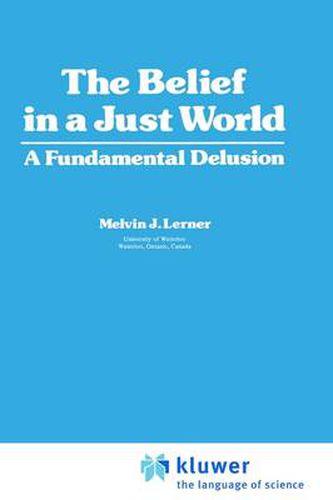Readings Newsletter
Become a Readings Member to make your shopping experience even easier.
Sign in or sign up for free!
You’re not far away from qualifying for FREE standard shipping within Australia
You’ve qualified for FREE standard shipping within Australia
The cart is loading…






This title is printed to order. This book may have been self-published. If so, we cannot guarantee the quality of the content. In the main most books will have gone through the editing process however some may not. We therefore suggest that you be aware of this before ordering this book. If in doubt check either the author or publisher’s details as we are unable to accept any returns unless they are faulty. Please contact us if you have any questions.
The belief in a just world is an attempt to capmre in a phrase one of the ways, if not the way, that people come to terms with-make sense out of-find meaning in, their experiences. We do not believe that things just happen in our world; there is a pattern to events which conveys not only a sense of orderli ness or predictability, but also the compelling experience of appropriateness ex pressed in the typically implicit judgment, Yes, that is the way it should be. There are probably many reasons why people discover or develop a view of their environment in which events occur for good, understandable reasons. One explanation is simply that this view of reality is a direct reflection of the way both the human mind and the environment are constructed. Constancies, patterns which actually do exist in the environment-out there-are perceived, represented symbolically, and retained in the mind. This approach cenainly has some validity, and would probably suffice, if it were not for that sense of appropriateness, the pervasive affective com ponent in human experience. People have emotions and feelings, and these are especially apparent in their expectations about their world: their hopes, fears, disappointments, disillusionment, surprise, confidence, trust, despondency, anticipation-and certainly their sense of right, wrong, good, bad, ought, en titled, fair, deserving, just.
$9.00 standard shipping within Australia
FREE standard shipping within Australia for orders over $100.00
Express & International shipping calculated at checkout
This title is printed to order. This book may have been self-published. If so, we cannot guarantee the quality of the content. In the main most books will have gone through the editing process however some may not. We therefore suggest that you be aware of this before ordering this book. If in doubt check either the author or publisher’s details as we are unable to accept any returns unless they are faulty. Please contact us if you have any questions.
The belief in a just world is an attempt to capmre in a phrase one of the ways, if not the way, that people come to terms with-make sense out of-find meaning in, their experiences. We do not believe that things just happen in our world; there is a pattern to events which conveys not only a sense of orderli ness or predictability, but also the compelling experience of appropriateness ex pressed in the typically implicit judgment, Yes, that is the way it should be. There are probably many reasons why people discover or develop a view of their environment in which events occur for good, understandable reasons. One explanation is simply that this view of reality is a direct reflection of the way both the human mind and the environment are constructed. Constancies, patterns which actually do exist in the environment-out there-are perceived, represented symbolically, and retained in the mind. This approach cenainly has some validity, and would probably suffice, if it were not for that sense of appropriateness, the pervasive affective com ponent in human experience. People have emotions and feelings, and these are especially apparent in their expectations about their world: their hopes, fears, disappointments, disillusionment, surprise, confidence, trust, despondency, anticipation-and certainly their sense of right, wrong, good, bad, ought, en titled, fair, deserving, just.